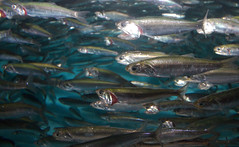
Its a bit of a circular title, but I think it is honest. Marine scientists are constantly shouting at walls of reporters and news consumers that everything is fucked (pardon my french, but its not untrue). And well, it sort of is. But how do we explain without being too overly alarmist? I get concerned when I read comments on news pieces and popular science articles or blog that follow along the lines of this one I saw on this Sign On San Diego article: Marine scientists focus on sardines, squid and other forage fish.
“These “scientists ” earn a living on fear .. they must keep fear going to continue to be paid .. as long as there is fear, there willl be groups to further fund the research into this fear .. and it is all a money game .. corruption, plain and simple ..”
The article discusses a push in California legislature to make “… state fishery managers account for the needs of marine predators when determining how much forage fish can be caught.” It is unclear how this will be done but the language of these regulations are typically along the lines of best available science. I could focus on the science – of which I do not know in great detail, though I’ve always supported an ecosystem approach to management – but I think this offers a chance to discuss some of the communications issues that impede conservation.
Most of the time we shrug off ridiculously negative online comments. Just someone gone trolling, someone has an agenda or general internet asshatery. But comments are the window into the soul of the populace (to some extent). Online, people can assume any persona they wish. Just go onto any popular youtube video and scroll down the comment list. It can be a dark, scary place.
Comments on conservation articles can be just as daunting. You typically get the extremes: overly supportive or bitter and vile. It takes a special kind of person to comment on online material. For positive commenters, you may want to throw your “like” in the ring or participate in constructive conversation. Most people don’t comment, and that is fine. Many (including myself) enjoy passively consuming news and opinion of a variety of types. From our Spring DSN Reader Survey, most of you do not comment here on DSN, but still enjoy our content and visit us often. The reasons were typically 1) didn’t feel qualified to comment (though over half of respondents carried graduate degrees), 2) generally never comment on blogs, and 3) feels like they never have anything else to add.
Negative commenters though, oh boy! They are someone special. I want to draw the line in the sand right off the boat that correcting typos, grammar and the like is not negative commenting, neither necessarily is contrarianism or skepticism of a post’s content. All of these are, or can be, constructive criticisms. We certainly welcome that! Negative commenting is spiteful, intentionally hurtful, not constructive and generally all around a bad, pointless idea. Nonetheless, all too common – more so on news sites or mainstream media than on blogs. One of the reasons I think this might be is that blogs, even small blogs, tend to generate or be integrated into communities where bad behavior is less tolerated. Bloggers can set their own rules for engagement however they want and may change everything on a whim if they so choose to. There is no higher power to answer to. Whereas mainstream media has, arguably, few built in filters – made trickier with all the social media commenting plugins – and the volume of comments makes it unpractical to police an article well. There are, of course, exceptions.
But comments are very insightful because someone took the time and felt the need to say something. We can use the negativity and turn it around and ask ourselves how can we dampen this type of response? In science communication, we need a little more of what I like to call preemptive communication. This means that we need to predict what is going to be offend or be wrong with what we are going to say in the future. Surely, a very hard, if not impossible, task. To circumvent this paradox, one needs to merely study the errors of previous communication efforts (including your own). Easier said than done I know! But think about it. You see a douchey negative comment online, what is your response? 1) Glance over or ignore it, 2) read it and chuckle and their ignorance, 3) read it and facepalm at their stupidity, 4) read it and respond with logic, 5) read it and respond with negativity, or 6) do you even bother reading comments at all?
I believe comments have intrinsic value to those of us honing our communications skills – which really should be all of us in the sciences. The National Science Foundation (NSF), a major source of government research funding in the U.S., goes as far as to require grantees to discuss how they will make their research – and more generally, science – broadly accessible. These “broader impacts” are sometimes glossed over, but the devil will come for his toll as the public support for basic research fades along with government funding. The situation is getting more dire such that NSF recently has proposed that grantees now justify how their broader impact statements will fit within the framework of national socioeconomic goals. As Daniel Sarewitz is quoted, “Assessments of the wider value of research are unpopular. Proposed changes will only produce more hype and hypocrisy.”
Furthermore, the national socioeconomic goals skirt around protecting the environment. So conservation science communicators are already facing an uphill battle. Messaging needs to anticipate an anti-science or ambivalent-science reception. Wading through oppositional talking points, dissecting dissension from vitriol, and circling around to preemptively attack these views is an unpleasant yet necessary task. Negative commenters live for the “gotcha” moment. The less we can give them, the more effectively we can keep on task. Of course, you can argue they will always find something to gripe at or just throw out their arms and claim conservationists have a hidden agenda and just make stuff up. That will never go away unfortunately. But maintaining a positive message, anticipating criticisms and keeping your head cool ca’t surely hurt.
I don’t know if these ideas are useful, but I do know we need to think outside of the box when it comes to communicating the needs for conservation. What I often see is dismissal based on misunderstanding, misinterpretation or outright agenda. We can’t take the high road and speak above people, dismissing them back. Its not useful and our common goals should include reaching out to new audiences. Something is working, if you poll people, anecdotally they support conservation and clean environment, but it doesn’t appear to be maintained through to any meaningful activism. Part of the goal of conservation communication is to convert, but a large part is also to push the fence sitters over the edge into action of some kind. Using negative comments as a lens into improving our communication efforts may just be one more thing we can do give some of those pushes, but at least to anticipate criticisms that may put off some of the passerby’s.
Share the post "Preemptive Conservation Communication Through the Lens of Negative Comments"






Certainly some of the overly negative comments can be used to address some of the anger and ignorance that’s often unspoken and unaddressed. My (younger) daughter likes to tell me “please don’t feed the trolls”, but I often leave troll or angry comments up (no matter how irrational) because I KNOW that someone out there is leaning toward thinking the same thing, and if I don’t address it, I lose them, too. It seldom works to adopt the same tone as the negative comment, although at times a show of strength is necessary with a bully. Instead I try to address the salient parts of the comment with logic and give the commenter additional reading and, where possible, research.
I’m not certain that the problem is science communication, but the value our society places on science. And I’m not terribly sure that the best way to get the message through isn’t from an emotional appeal. While, as objective persons who thrive on logic, we will naturally recoil from such an assertion, we DO need to realize that while people KNOW from education, they BELIEVE because of their emotions. No matter how we say something that’s not going to sit well with a political agenda, it’s going to be countered with an emotional appeal, like the accusation that we’re peddling fear.
The other thing I find is that no matter how angry, vile, or seemingly irrational a negative comment is, addressing it rationally helps me see new facets of the topic I’m discussing, and how it may be misunderstood, misused, refined, or expanded. Generally the only comments I ignore (or delete) are spam. There’s something to be learned from even the most vile diatribe.
oh yes, but that is a separate topic, though intertwined. I agree about addressing comments rationally and that was part of my point (which I failed to make clear). That interaction between writer and reader is critical in online communication. Engagement goes a long way.
I think we also need to realize that while engaging the commentator may not result in educating that particular individual, there are others reading the exchange who may be more open to understanding.
While in theory I agree with the need to engage negative commenters, in practice, reading the comments section of most news stories makes me want to climb up a clock tower and start shooting random people with a crossbow or something. Well, OK, maybe not literally. But in your list of possible responses, #3 (“read it and facepalm at their stupidity”) is not quite strong enough. Your list needs a #7: Read it, lose all faith in humanity, and feel compelled to leave the computer in search of an adult beverage so that you don’t lose control and take your wrath out on an innocent piece of electronic equipment.
I totally agree. This is arguably the more important reason to reply to negative/angry/misinformed comments. The presence of a calm, confident reply can have a miraculous cooling effect on an overheated thread.
It sometimes is hard to sift through negative comments to find the nuggets. What is interesting, yet very irritating, is how quickly threads can go way off track especially when it comes to evolution, global warming, etc. It’s kind of easy to believe in the conspiracy theory that there are armies of creationists and denialists paid to pounce with the same old talking points.
On a blog such as this one, one reason comments tend to be more constructive is because scientists are contolling the message and there tends to be less sensationalism. On MSM (I’ll include sites like HuffPo in this category) sites, scientists say one thing, the media distorts the message to increase page views and the inconsistencies in the MSM’s often very poor science reporting gives the trolls plenty to feed on. Scientists say ‘x may cause y’, the MSM reports ‘scientists say x causes y and we’re all gonna die’.
So, yes, responding to trolls rationally is the best course to take. But maybe we should direct that energy to fixing the fundamental problems rather than the results of them?
I agree but I was attempting to suggest that we need to study better the negative comments online in order to anticipate and preemptively remediate these situations. Perhaps it just isn’t possible?
I think it’s possible, but it is a very tall order. What’s more though I think addressing the negative comments issue (by preemptive means) is part of the solution to the larger issue of message distortion. When comments are not addressed in the first place, or pre-empted (better) then the negative commenter and their agenda can often end up taking over the discussion or becoming the take away message to other readers, including more MSM outlets.